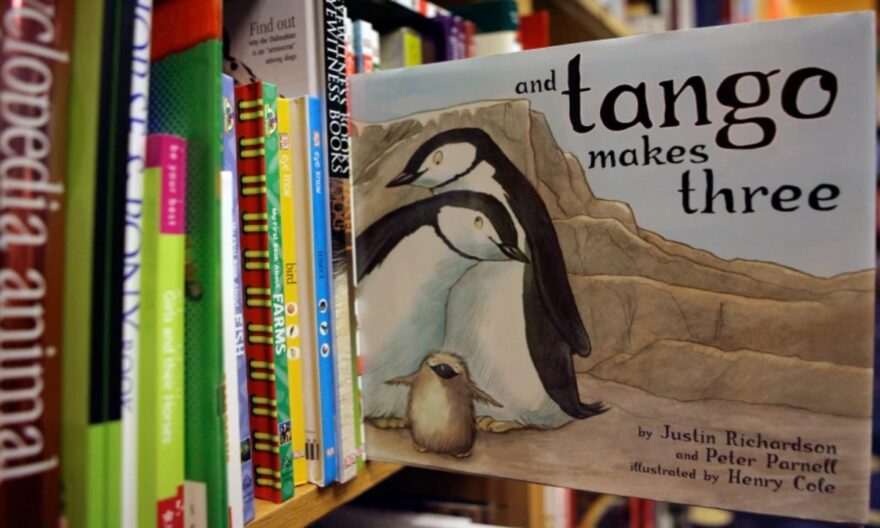
A group consisting of six students, their parents, and two authors has taken legal action against a central Florida school after it banned access to a children’s book depicting the story of two male penguins raising a baby penguin.
The book in question, “And Tango Makes Three,” is based on the real-life account of two male penguins at New York City’s Central Park Zoo who adopted and nurtured an orphaned penguin chick named Tango.
Last year, the Lake County school board, situated near Orlando, prohibited students from kindergarten through third grade from accessing the book. The district justified its decision by citing Florida’s Parental Rights in Education law, which restricts classroom instruction or involvement by school personnel and third parties regarding sexual orientation or gender identity for students in kindergarten through third grade, unless it aligns with age-appropriate and developmentally suitable standards. This legislation, signed by Governor Ron DeSantis in March 2022, has been commonly referred to as the “Don’t Say Gay” law by critics.
Governor DeSantis recently expanded the law by signing a bill that extends the prohibition of sexual orientation or gender identity instruction to include pre-kindergarten through eighth grade. Additionally, it imposes restrictions on reproductive health education for students in sixth through 12th grade and mandates that such instruction be appropriate for the students’ age and development in accordance with state standards. The law is applicable to both public and charter schools.
A lawsuit was filed on Tuesday in the U.S. District Court for Middle Florida, contending that Florida’s law is “vague and overbroad” and that the school district’s decision to restrict access to the book “And Tango Makes Three” violated the First Amendment.
The lawsuit argues that the law discriminates based on content and viewpoint, infringing upon the authors’ freedom of expression. It further claims that the district’s restriction of access to the book, which was previously available, violates students’ right to receive information for narrow partisan and political reasons.
Authors Peter Parnell and Justin Richardson issued a joint statement, stating that they filed the lawsuit to uphold the American principle that no child should be denied age-appropriate information in school due to the beliefs and biases of others. They aim to defend students’ right to read a heartwarming story promoting acceptance, love, and embracing differences, while also protecting authors from censorship rooted in intolerance.
Six students, ranging in age from 5 to 12, are represented in the lawsuit through their parents or legal guardians. They have expressed their interest in reading the book for various reasons.
According to the complaint, one of the students, Z.T., who is 12 years old, identifies as gay and enjoys reading LGBTQ stories.
The complaint states “Z.T. is drawn to Tango’s tolerant, kindhearted, and family-friendly depiction of two parents of the same sex who raise an adopted child— a family structure that she could someday have with a future spouse”.
Another student mentioned in the complaint is D.S., who resides with his grandmother, brother, and half-brother. D.S. is interested in reading “And Tango Makes Three” to gain insights into different family structures.
The complaint explains “D.S.’s family looks different from the families of many of his friends and classmates at Beverly Shores Elementary School, who live in two-parent households in which all of the children are biologically related to each other and both of their parents,” the complaint says. He also wants to read the book because he loves animals and wants to become what he calls an “animal doctor”.
In a statement, Faith E. Gay, an attorney representing the plaintiffs from Selendy Gay Elsberg PLLC, emphasized that any law prohibiting books like “And Tango Makes Three” disregards fundamental constitutional principles of freedom of speech and expression.
Gay further noted that “It also flies in the face of deeply-held American values we all share: respect for families, responsible parenting, openness, hospitality and generosity of spirit.”
This lawsuit marks the second legal action taken against a Florida school district regarding book restrictions. In the previous month, the Escambia County School District and its school board were sued by Pen America, Penguin Random House, authors, students, and parents for the removal of ten books related to race and the LGBTQ community.
Additionally, in the previous year, students, teachers, and parents filed a separate lawsuit aimed at blocking the implementation of the “Don’t Say Gay” law. However, a federal judge dismissed the lawsuit in February.




